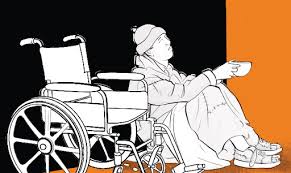

On December 3, every year, the world comes together to mark the International Day of Persons with Disabilities (IDPD).
The World Health Organisation (WHO) says the day is about promoting the rights and well-being of persons with disabilities at every level of society and development.
It is also about raising awareness of the situation of persons with disabilities in all aspects of political, social, economic, and cultural life.
This year, the theme is “Amplifying the leadership of persons with disabilities for an inclusive and sustainable future”.
“This theme recognises the important role that persons with disabilities play in creating a more inclusive and sustainable world for all,” United Nations says.
“It also emphasises the importance of the participation of persons with disabilities in decision-making processes that affect their lives”.
Persons with disabilities make up 16 percent of the global population, yet they rarely access leadership roles in the health sector.
What needs to change in Kenya
As Josephine Mwende of Nguvu Collective Change leaders joins others in celebrating the day, she says there is a need to amplify the leadership of persons with disabilities for an inclusive and sustainable future.
Mwende adds that there needs to be a long-term and systematic inclusion of persons with disabilities in all aspects of life.
“This should be done ensuring that the conversation around disability goes beyond one-day events and becomes an integral part of policies, programs and social norms,” she adds.
Mwende has put forth a charter of five key demands which include the aforementioned inclusion of PWDs, immediate implementation of updated disability laws, such as the Persons with Disabilities (Amendment) Bill, 2023, to ensure that the rights of persons with disabilities are protected effectively and consistently.
The Persons with Disabilities (Amendment) Bill, 2023 is a legislative proposal aimed at improving the rights, welfare, and inclusion of PWDs in society.
The Bill seeks to amend the Persons with Disabilities Act, 2003, to ensure that the laws and policies surrounding the rights of PWDs are more comprehensive, inclusive, and aligned with international standards, particularly those set by the United Nations Convention on the Rights of Persons with Disabilities (CRPD).
The key aspects of the Bill include enhancing representation and participation, improved accessibility, inclusive education, employment and economic empowerment, social protection and welfare, addressing discrimination and harassment and legal reforms.
Mwende also put forth the need for comprehensive representation of PWDs in governance, particularly at the county level, to ensure their voices are part of decision-making processes.
She noted the need for awareness campaigns to break attitudinal barriers and address societal stigmas and stereotypes, promoting the view of persons with disabilities as capable, equal contributors to society.
Mwende also emphasised the need for suitable access to employment opportunities and inclusive workplaces, to ensure economic independence and empowerment for PWDs.
What is changing elsewhere?
At organisations like WHO, they are also working to amplify the leadership of PWDs.
WHO says it is including persons with disabilities in decision-making processes in the health sector, noting that it is a fundamental step to drive change towards a more inclusive and sustainable future.
“To support governments and health sector partners to advance health equity, WHO published a new health system strategic planning tool which facilitates the meaningful engagement of persons with disabilities in line with human rights-based approaches,” it adds.
The International Trade Union Confederation (ITUC) calls for urgent global action to eliminate barriers faced by the one billion people of working age worldwide who have disabilities.
“Social justice is impossible without full inclusion of persons with disabilities,” Luc Triangle, ITUC General Secretary says.
“Trade unions worldwide are committed to fighting for their rights, ensuring decent work, and fostering workplace cultures that value diversity and inclusion. A New Social Contract that leaves no one behind is essential for truly democratic societies.”



